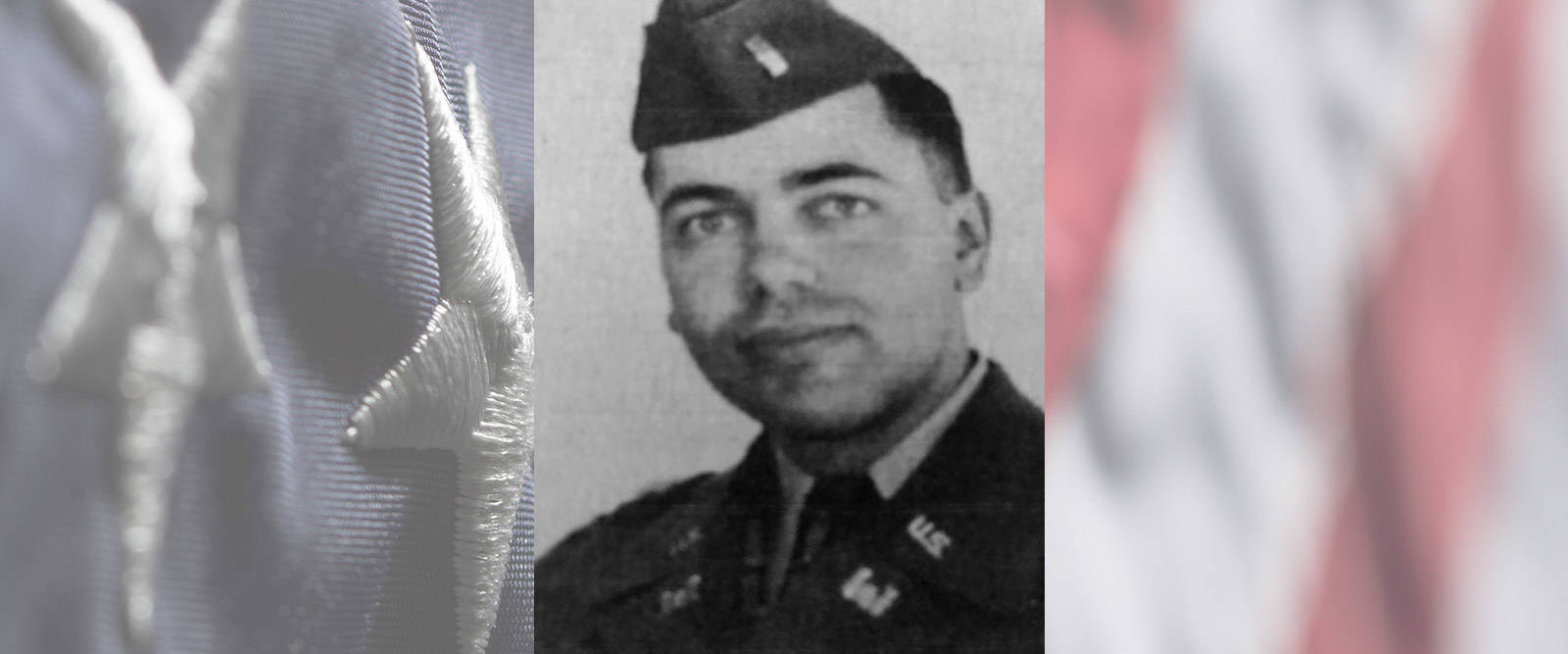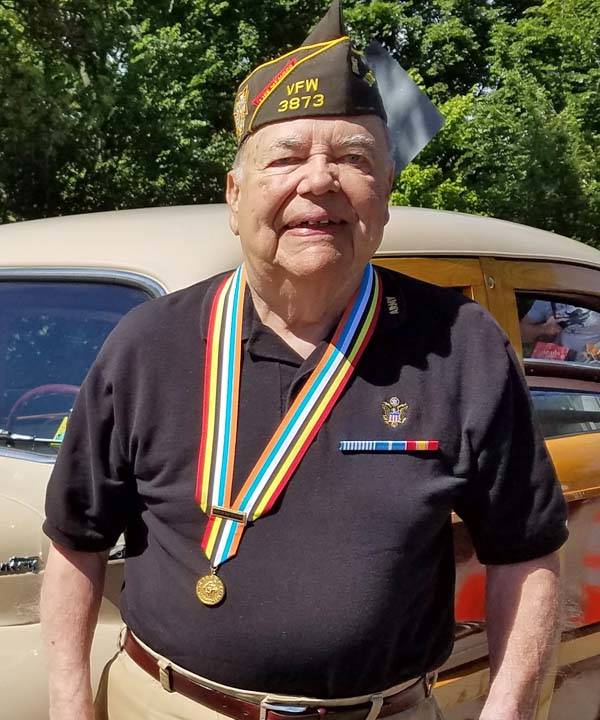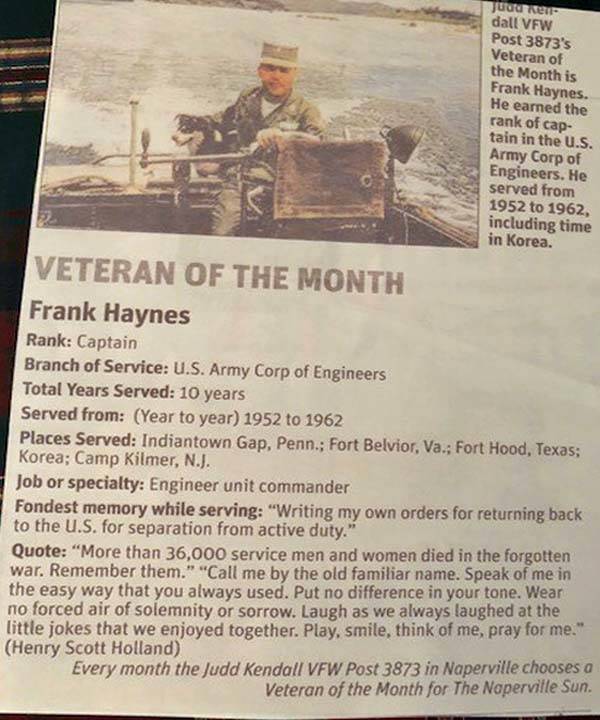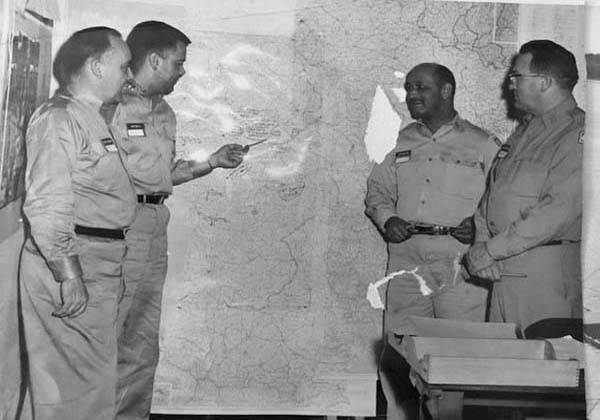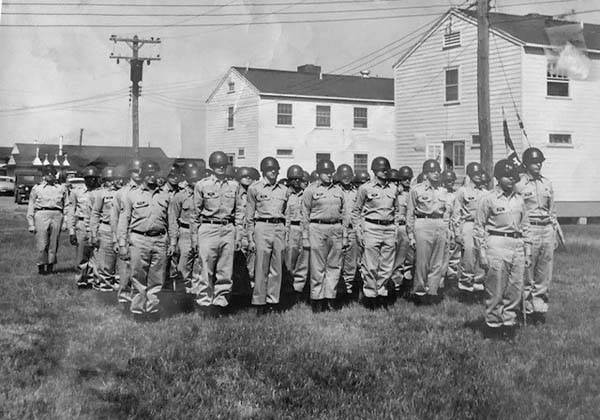U.S. Army Korean War Naperville, IL Flight date: 08/08/18
By Charlie Souhrada, Honor Flight Chicago Veteran Interviews Volunteer
Frank Haynes’ family has a strong tradition of military service. Frank’s father, Tom Sr., served in World War I. Older brothers, Tom Jr. and Joseph, served in World War II. Frank served in the Army during the Korean War and his twin brother, Richard, served in the National Guard, also during the Korean War era. In the front window of his house, a blue star banner is on display to honor one of his six grandchildren, who currently serves. “We all put ourselves on the line when it mattered and that makes me proud!” he says.
Frank’s story begins October 8, 1930, when he and his twin, Richard, were born in Philadelphia to Tom Sr. and Etta. The twin brothers joined older siblings Tom Jr., Mary and Joseph, completing the family. “My father was in the wholesale meat business,” Frank remembers. “He represented turkey growers in Colorado, but he wanted to have a farm of his own where he could grow his own product.” Frank’s dad bought a farm in Mendham, NJ and became a “gentleman farmer” while continuing to work in the meat industry in New York City, achieving his lifelong dream. During the summer months in high school, the Haynes boys would help around the farm and bring in the hay.
Right before their sophomore year of high school, Frank and Richard were enrolled in the Delbarton School, a small, all-boys’ boarding school that offered instruction from 7th grade through the second year of high school in nearby Morristown. At the time, Delbarton was considering adding a four-year high school program. “We went and talked to the headmaster who told my father ‘we’re planning on opening a fully-accredited high school. If your two boys come, we’ll definitely start this year!’ We always took credit for starting the school!” At Delbarton, Frank played football and basketball, and he joined his twin in the school’s first high school graduating class of 12 students in 1948. Frank then entered Catholic University in Washington, DC, where he majored in economics and graduated in June 1952. Two months later, Frank was drafted into the Army infantry and sent to Fort Indiantown Gap, PA, for Basic Training. There, he remembers having to climb a mountain nearly every night.
“At that time, you were drafted for a period of 24 months. I soon learned that if you became an officer, you only had to serve 18 months from the date you were commissioned,” he says. “Since I would be able to complete Basic Training and OCS (Officer Candidate School) within a year, I figured the six months was probably worth it. And being an officer would look good on a resume, so I applied for Officer Candidate School.”
He shrewdly assessed that the other applicants had indicated they wanted to be in finance or some type of office job. To set himself apart, he put down that he wanted to go to engineering school to improve his chances by being one of the few. “I wanted to be an officer, and this was a deliberate move on my part!” His assessment paid off, and he was accepted into the engineer program at Fort Belvoir, VA in spring 1953.
In August 1953, Frank graduated from OCS, and he was commissioned as a second lieutenant. From OCS, his first assignment was at Fort Hood, TX, where he served in an engineer support group with the 1st Armored Division. Despite the truce in Korea, he received his orders to go to Asia in early 1954. He flew to Japan and spent six weeks training in the former Japanese naval academy outside of Hiroshima. Afterward, he traveled by ship to Incheon, Korea, where he was assigned to a separate engineer company responsible for building and maintaining float bridges in the I-Corps area.
“The Corps of Engineers makes the way for troops to ford rivers and advance,” he says. “Without combat engineers, troop movements aren’t possible.” Frank’s company was stationed approximately one mile away from the demilitarized zone, with the North Koreans monitoring the company’s efforts to maintain bridges in the area. “We never saw them, but we knew they were looking down on us.” He remembers his best day was the day he cut his own orders and sent himself back to the United States. “I signed my own paperwork in 1955,” he says with pride. “Not many people get a chance to do that!”
Soon after returning from Korea, Frank joined the active Army Reserves. “At that time, there was a lot of Cold War activity and we were always ready, always thinking we might get called up!” In the reserves, he was assigned to the 19th Engineer Group, where he served as headquarters company commander. His military career finally ended in 1962 after earning the rank of captain.
In 1956, he met his future wife, Pat, through his twin brother Richard. “Pat was a college roommate of Richard’s wife, and when we were introduced, we made a connection.” That initial spark led to an enduring marriage, four daughters—Beth, Susan, Mary and Patty—six grandchildren, and six great-grandchildren.
During his time in the reserves, Frank began to build a career in computing, where he managed large, mainframe systems that took up entire office floors. He started with Prudential Insurance in Newark, NJ in 1954, where he helped manage billing systems, then left in 1962 to join GE. He moved to the Chicago area in 1973 to set up a computing system for a baking company, then switched careers after earning his real estate license. “My father was always big on real estate and he inspired me to make the leap.” After suffering a stroke in 2014, he completed his last transaction and officially retired.
In his retirement, Frank laughs that his biggest responsibility is staying out of Pat’s way. To accomplish this, he has served as a precinct committeeman in Naperville, is active at St. Thomas Catholic Church, the American Legion and Naperville Judd Kendall VFW Post 3873, where he serves as the “gambling czar” for casino nights. Most recently, he had the honor of serving as the Grand Marshal for Naperville’s Memorial Day Parade.
“I love being around people and encourage all veterans to get involved in their local American Legion, VFW or Honor Flight organizations by raising funds or helping where possible,” he says. “There are so many fellow veterans who need the basics in life or just someone who understands. Our brotherhood doesn’t end when we take off that uniform.”
Thank you for putting yourself on the line. We hope you enjoy your well-earned, much deserved Honor Flight!



